Should streams have rights? Should corporations?
Anyone who knows me knows how much I love spending time in nature and want to conserve it so it can regenerate. Still, even I considered the idea of giving rights to animals and nature weird and possibly counter productive. This article’s headline made me cringe at first, Streams and lakes have rights, a US county decided. Now they’re suing Florida:

How can streams have rights? How can they sue? If we give them rights, what else will we give rights to? How do we assign interest to brainless things?
I learned about this movement years ago. The article above linked to a recent history of it in another article, It’s only natural: the push to give rivers, mountains and forests legal rights.
What about corporations? They have rights but no brains.
Then I thought about a comparison I hadn’t seen: What about corporations? They have rights but no brains. Corporations sue. If streams have no brains, corporations may have negative brains, at least regarding our stewardship of nature, or lack thereof.
We’ve granted rights to persons we call fictitious, contrasting corporations with natural persons. At least streams are natural, having existed before humans and will exist after humans are gone. We create rights and laws as ways to see the world and agree on how to interact. There’s no book in the sky that says what should or shouldn’t have rights. What we, through democratic processes, agree are rights and who or what should have them seems the best way to decide as a community.
I haven’t thought the idea through enough to decide how I feel about it, but at least it sounds no less plausible than corporate personhood. It seems that anyone who claims streams can’t sue or have rights is also claiming that corporations can’t either. Maybe neither should, maybe both. I’d love other people’s thoughts to help expand my understanding.
Read my weekly newsletter

On initiative, leadership, the environment, and burpees